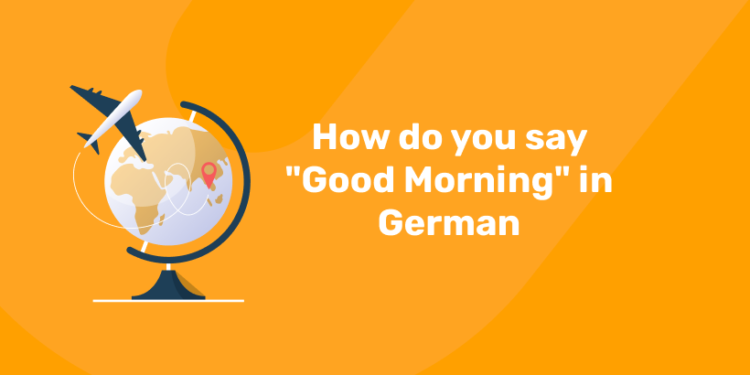Table of Contents
Introduction
Learning how to say hello in a language is one of the first steps to learning that language. For anyone learning German, saying Good morning is a must. This simple but important greeting sets the tone for your day whether you’re in Germany, Austria, Switzerland or any other German speaking country. In this post we’ll look at how to say Good morning in German but also formal alternatives, tips for practicing German greetings and how to fit these into your daily routine.
How to say Good Morning in German?
1: How do you say "Good Morning" in German?
The most common way to say Good morning in German is Guten Morgen. This is used in all German speaking countries and is the morning greeting. It’s a combination of gut which means good and Morgen which means morning. Together they make a greeting that is simple and versatile and can be used in almost any situation.
Guten Morgen can be used from early morning until around 11:00 am after which Guten Tag (Good day) is more appropriate. This greeting is good for both casual and formal situations so is a safe bet when you’re not sure what level of formality is required.
Pronunciation Tips
For English speakers Guten Morgen might seem easy to pronounce but there are a few things to bear in mind. The G in Guten is pronounced like the G in good but softer. The u is like the oo in good. Morgen follows the same rules, the o is like the o in more and the r is rolled but not as much as in some other languages.
To get your pronunciation perfect try listening to native speakers and repeating the phrase a few times. This will help you sound more natural and confident when using this greeting.
Formal alternatives to Good Morning in German
While Guten Morgen is the standard way to say Good morning there are several formal alternatives you can use depending on the situation. For example if you’re in a business setting or addressing someone you don’t know well you might want to use a more formal greeting.
1. “Ich wünsche Ihnen einen guten Morgen”
This means I wish you a good morning and is more formal and polite. It’s often used in business emails, formal letters or when you want to be extra polite.
2. “Einen schönen guten Morgen”
Means A beautiful good morning and is a bit more formal than Guten Morgen. Can be used when you want to be polite and friendly.
3. “Guten Morgen, meine Damen und Herren”
This means “Good morning, ladies and gentlemen” and is used when speaking to a group, like during a presentation or in a formal meeting.
Not just for business but for any situation where you want to be polite.
German Greetings Practice: Tips and Exercises
Practice is key to learning a language and so is mastering greetings like “Guten Morgen”. Here are some tips and exercises to practice German greetings and get more comfortable with them in daily life.
1. Flashcards
Make flashcards with German greetings on one side and their English translation on the other. This will help you to memorize and recall when you need to use them in conversation.
2. Practice with Native Speakers
Best way to practice is to speak with native German speakers. You can do this through language exchange programs, online platforms or even by visiting a German speaking country. The more you practice the more natural you will sound.
3. Greetings
Use German greetings like “Guten Morgen” in your daily life, even if it’s just to yourself. This could be when you wake up, greet your family or even say “Good morning” to your pets. Just make them a habit.
4. Listen and Repeat
Watch German TV shows, listen to German podcasts or find videos online where you can hear native speakers say greetings. Repeat what you hear, pay attention to pronunciation and intonation.
5. Record yourself
Record yourself saying “Guten Morgen” and other greetings. Listen back.
Greeting Etiquette in Germany
Greeting culture is big in German speaking countries. In Germany, greetings are taken seriously and the way you greet someone sets the tone for the whole interaction. Being polite is highly valued and using the right greeting is part of that.
In business, you should shake hands and say “Guten Morgen” and make eye contact. In more relaxed settings, a simple “Guten Morgen” with a smile is enough.
Also, in Germany people greet everyone individually, not with a group greeting. So if you enter a room with several people you should greet each person with a “Guten Morgen”.
Expand Your German Vocabulary: Beyond “Good Morning”
Once you’ve mastered “Guten Morgen” you might want to expand your German vocabulary by learning other greetings and phrases. Here are a few more:
- Guten Tag (Good day): After 11:00 AM until evening.
- Guten Abend (Good evening): In the evening.
- Gute Nacht (Good night): Before going to bed or when saying goodnight late at night.
- Wie geht’s? (How are you?): A casual way to ask someone how they are.
- Auf Wiedersehen (Goodbye): Formal way to say goodbye.
- Tschüss (Bye): More casual way to say goodbye.
Expanding your vocabulary will not only improve your language skills but also make you feel more confident in social and professional situations.
Why Entri?
Learning a new language is hard, but with the right resources it’s fun and rewarding. If you want to master German, sign up for a language course with Entri. Entri offers a full German language course to take you from beginner to fluent.
Entri is different because it focuses on practical language skills you can use in real life. The course is created by experienced language teachers and includes interactive lessons, quizzes and practice exercises. And with the Entri app you can learn German whenever and wherever you want.
Sign up now at Learn German with Entri and start learning today!
Quiz: German Greetings
Common Greetings
1. What is the most common way to say “Good morning” in German?
a) Guten Abend
b) Guten Morgen
c) Gute Nacht
d) Guten Tag
Answer: b) Guten Morgen
2. Which part of the day is “Guten Morgen” typically used?
a) Evening
b) Afternoon
c) Morning
d) Night
Answer: c) Morning
3. What does “Morgen” mean in English?
a) Day
b) Morning
c) Evening
d) Night
Answer: b) Morning
4. What is the literal translation of “Guten Morgen”?
a) Good evening
b) Good night
c) Good day
d) Good morning
Answer: d) Good morning
5. How would you say “Good morning, ladies and gentlemen” in German?
a) Guten Morgen, meine Damen und Herren
b) Guten Tag, meine Damen und Herren
c) Guten Abend, meine Damen und Herren
d) Gute Nacht, meine Damen und Herren
Answer: a) Guten Morgen, meine Damen und Herren
Formal and Appropriate Usage
6. Which German greeting is more appropriate after 11:00 AM?
a) Guten Abend
b) Guten Tag
c) Guten Morgen
d) Gute Nacht
Answer: b) Guten Tag
7. What is a more formal way to say “Good morning” in German?
a) Guten Abend
b) Einen schönen guten Morgen
c) Gute Nacht
d) Guten Tag
Answer: b) Einen schönen guten Morgen
8. Which German word means “good”?
a) Tag
b) Nacht
c) Gut
d) Morgen
Answer: c) Gut
9. What is the formal German greeting often used in emails?
a) Guten Abend
b) Guten Morgen
c) Ich wünsche Ihnen einen guten Morgen
d) Guten Tag
Answer: c) Ich wünsche Ihnen einen guten Morgen
10. How do you say “Good day” in German?
a) Guten Abend
b) Guten Tag
c) Guten Morgen
d) Gute Nacht
Answer: b) Guten Tag
Vocabulary and Context
11. What is the German word for “day”?
a) Nacht
b) Tag
c) Abend
d) Morgen
Answer: b) Tag
12. Which greeting is used before going to bed?
a) Guten Tag
b) Guten Morgen
c) Gute Nacht
d) Guten Abend
Answer: c) Gute Nacht
13. How do you ask “How are you?” in German?
a) Wie geht’s?
b) Guten Tag
c) Guten Morgen
d) Auf Wiedersehen
Answer: a) Wie geht’s?
14. Which greeting is appropriate for the evening in German?
a) Guten Morgen
b) Guten Tag
c) Guten Abend
d) Gute Nacht
Answer: c) Guten Abend
15. What does “Auf Wiedersehen” mean in English?
a) Good morning
b) Goodbye
c) Good day
d) Good night
Answer: b) Goodbye
Informal and Cultural Context
16. Which German greeting means “Goodbye” in a casual way?
a) Auf Wiedersehen
b) Guten Tag
c) Guten Morgen
d) Tschüss
Answer: d) Tschüss
17. In German culture, how important is it to greet everyone individually in a room?
a) Not important
b) Somewhat important
c) Very important
d) It depends
Answer: c) Very important
18. Which greeting is commonly used in German-speaking countries after the evening meal?
a) Guten Morgen
b) Guten Abend
c) Guten Tag
d) Gute Nacht
Answer: d) Gute Nacht
19. How is the “G” in “Guten” pronounced?
a) Like the “G” in “go”
b) Like the “G” in “good”
c) Like the “G” in “gel”
d) Like the “G” in “gig”
Answer: b) Like the “G” in “good”
20. What does “Guten Tag” literally translate to in English?
a) Good morning
b) Good day
c) Good night
d) Good evening
Answer: b) Good day
Practical Applications
21. How do you say “Good morning, everyone” in German?
a) Guten Morgen, alle
b) Guten Morgen, jeder
c) Guten Morgen, alle zusammen
d) Guten Morgen, meine Damen und Herren
Answer: c) Guten Morgen, alle zusammen
22. Which greeting would you use in Germany after a morning jog?
a) Guten Tag
b) Guten Morgen
c) Guten Abend
d) Auf Wiedersehen
Answer: b) Guten Morgen
23. What’s the best greeting to use when entering a store in the morning in Germany?
a) Guten Abend
b) Auf Wiedersehen
c) Guten Morgen
d) Gute Nacht
Answer: c) Guten Morgen
24. What greeting is appropriate when meeting someone for the first time in the morning?
a) Guten Abend
b) Guten Morgen
c) Auf Wiedersehen
d) Tschüss
Answer: b) Guten Morgen
25. Which of the following is not a German greeting?
a) Guten Tag
b) Guten Abend
c) Buongiorno
d) Guten Morgen
Answer: c) Buongiorno (which is Italian for “Good morning”)
Conclusion
Saying “Good morning” in German is more than just learning a phrase—it’s about understanding the cultural nuances and practicing until it feels natural. “Guten Morgen” is the most common way to greet someone in the morning, but knowing formal alternatives and practicing your pronunciation will help you make a great impression, whether you’re in a casual or professional setting.
By incorporating German greetings into your daily routine and using resources like German course, you’ll be well on your way to becoming fluent. Remember, practice makes perfect, and the more you use these greetings, the more confident you’ll become. Start your day off right with a friendly “Guten Morgen,” and open the door to new opportunities and connections in the German-speaking world.
Frequently Asked Questions
How do you say "Good Morning" in German?
In German, the phrase for “Good Morning” is “Guten Morgen.” This is the standard way to greet someone in the morning, whether you are at home, work, or meeting someone for the first time.
What is the literal translation of "Guten Morgen"?
The literal translation of “Guten Morgen” is “Good Morning.” The word “Guten” means “good,” and “Morgen” means “morning.” Together, they form a polite and friendly morning greeting.
When should I use "Guten Morgen" in Germany?
“Guten Morgen” is typically used from the early hours of the morning until around 11:00 AM. After this time, Germans usually switch to “Guten Tag,” which means “Good Day.” Using “Guten Morgen” outside of morning hours might seem unusual to native speakers.
Are there formal alternatives to "Guten Morgen" in German?
Yes, there are formal alternatives to “Guten Morgen.” One example is “Einen schönen guten Morgen,” which translates to “A beautiful good morning.” This phrase is more elaborate and is often used in more formal or polite settings to convey a sense of warmth and respect.
How do you say "Good day" in German?
The phrase “Good day” in German is “Guten Tag.” This greeting is used from late morning through the afternoon and can be used in both casual and formal situations. It’s a versatile greeting that is suitable for most daytime interactions.
Is "Guten Morgen" used in both casual and formal settings?
Yes, “Guten Morgen” is appropriate for both casual and formal settings. Whether you’re greeting a colleague at work, a friend, or someone in a professional environment, “Guten Morgen” is a universally accepted way to start the day.
How do you respond to "Guten Morgen" in German?
When someone says “Guten Morgen” to you, the typical response is to say “Guten Morgen” back. Alternatively, you can simply say “Morgen,” which is a more casual and shortened version of the greeting. This is similar to responding with “Morning” instead of “Good Morning” in English.
Can I use "Guten Morgen" in the afternoon?
No, “Guten Morgen” is not used in the afternoon. Once the morning hours have passed, it’s more appropriate to switch to “Guten Tag” or “Good day.” Using “Guten Morgen” after the morning might confuse people and make it seem like you’re not aware of the time.
What is the difference between "Guten Morgen" and "Guten Tag"?
The primary difference between “Guten Morgen” and “Guten Tag” lies in the time of day they are used. “Guten Morgen” is used exclusively in the morning, while “Guten Tag” is used after the morning hours until the evening. Both phrases are polite and can be used in a variety of settings.
How can I practice German greetings effectively?
To practice German greetings effectively, you can engage in conversations with native speakers, either in person or through language exchange programs. Additionally, using language learning apps that focus on speaking and listening can help reinforce your skills. Joining a structured course, such as the German language course offered by Entri, can also provide you with the necessary tools and practice opportunities to master these greetings and improve your overall German language proficiency.










